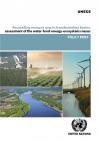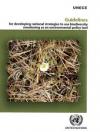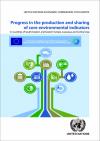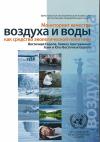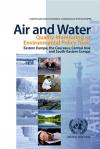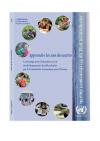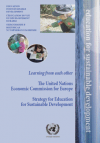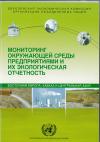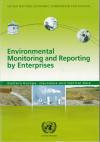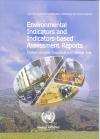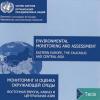Publications
Displaying Results 81 - 100 of 121
- English
This policy brief provides an introduction towards the different stages of and benefits from an assessment of the water-food-energy-ecosystems nexus, with a specific focus on resource use in transboundary basins. It summarizes the experience from the first three transboundary basins where a methodology for participatory assessment of intersectoral linkages, trade-offs and benefits in
- English
Ten Years of the UNECE Strategy for Education for Development - Evaluation report on the implementation of the UNECE Strategy for Education for Sustainable Development from 2005 to 2015. This evaluation report summarises the progress, challenges and achievements of ECE member States from 2005 to 2015 in implementing the UNECE Strategy for ESD. The report reviews
- Pусский
ECE/CEP/176
- English
Available in English and in Russian (not laid out). (ECE/CEP/176, 44 pp.)
This publication contains guidelines to help make biodiversity monitoring a practical tool for environmental policy for countries of Eastern Europe, the Caucasus, Central Asia and South-Eastern Europe. The guidelines offer advice on how to:
Develop plans and strategies for conservation and sustainable use of
- Pусский
ECE/CEP/175
- English
Available in English and Russian (not laid out). (ECE/CEP/175, 44 pp.)
The United Nations Economic Commission for Europe (UNECE) Programme on Environmental Monitoring and Assessment assists UNECE member States in working with environmental data and information to enable their timely flows and adequate assessment. In this way, the Programme helps enable an informed decision-making process,
- English
Empowering educators for a sustainable future: Tools for policy and practice workshops on competences in education for sustainable developmentThis publication builts on the Learning for the Future: Competences in Education for Sustainable Development (ECE/CEP/AC.13/2011/6) report, drafted by the UNECE Expert Group on Competences, which gives advice on: (a) what competences educators need in
- English
Learning for the future – competences for education for sustainable developmentThe competences in ESD described in this document are those of educators and not of learners, although both are intricately related. They go beyond the competences that individual educators would have in order to provide a good quality education
- Pусский
Доступно на английском и русском языках. (ECE/CEP/168, 48 стр.)
Настоящая публикация содержит руководящие принципы, которые предназначены для того, чтобы содействовать превращению мониторинга в практическое средство экологической политики в странах Восточной Европы, Кавказа, Центральной Азии и Юго-Восточной Европы. Данные руководящие принципы содержат рекомендации в отношении того, каким
- English
Available in English and Russian. (ECE/CEP/168, 46 pp.)
This publication contains guidelines to help make monitoring a practical tool for environmental policy for countries of Eastern Europe, the Caucasus, Central Asia and South-Eastern Europe. The guidelines offer advice on how to:
Link air and water quality monitoring to environmental policy development.
Modernize and upgrade air and
- Français
The UNECE Strategy for ESD is a policy tool that helps the countries of the region to introduce and promote ESD in national formal, non-formal and informal education in their respective countries. It aims at developing policy, regulatory and operational frameworks to support ESD, equipping educators with the necessary competences, ensuring that adequate tools and materials for ESD are accessible
- English
The UNECE Strategy for ESD is a policy tool that helps the countries of the region to introduce and promote ESD in national formal, non-formal and informal education in their respective countries. It aims at developing policy, regulatory and operational frameworks to support ESD, equipping educators with the necessary competences, ensuring that adequate tools and materials for ESD are accessible
- English
“Learning from each other” is the main theme of this collection of GoodPractices in Education for Sustainable Development in the UNECE region. Thesegood practices and shared experiences, which were provided by a range of different stakeholders, are concrete examples of successful implementation of ESD in different fields and sectors, from the political to the school level, and including
- Pусский
Доступно на английском и русском языках. (ECE/CEP/141, 48 стр.)
В странах Восточной Европы, Кавказа и Центральной Азии требуется существенное улучшение мониторинга состояния окружающей среды и сбора данных, Таких улучшений трудно добиться без твердой решимости и сотрудничества со стороны предприятий.
Настоящая публикация содержит Руководство по совершенствованию мониторинга окружающей среды
- English
Available in English and Russian. (ECE/CEP/141, 37 pp.)
Substantial improvements in environmental monitoring and data collection are needed in countries of Eastern Europe, Caucasus and Central Asia. Such improvements are difficult to achieve without the commitment and cooperation of enterprises.
The present publication contains the Guidelines for Strengthening Environmental Monitoring and
- Pусский
Доступно на английском и русском языках. (ECE/CEP/140, 120 стр.)
Экологические показатели являются незаменимым инструментом при оценке состояния окружающей среды, подготовке экологических докладов и формировании природоохранной политики. Они могут показать основные тенденции и помочь в описании причинно-следственных связей в изменении экологических условий. Они могут также помочь в выработке
- English
Available in English and Russian.
(ECE/CEP/140, 102 pp.)
Environmental indicators are a key tool for environmental assessment, reporting and policymaking. They can show key trends and help describe causes and effects of environmental conditions. They can also help in setting priorities and evaluating environmental policy implementation and in assessing compliance with international commitments
- Pусский
Доступно в качестве архивной копии.
ISBN 92-1-002114-2 Sales No. GV.E/R.04.0.3
Процесс «Окружающая среда для Европы», осуществляется в целях укрепления международного сотрудничества в области охраны и оздоровления окружающей среды во всей Европе, с 1991 года. Европейская
- English
Available as an archived copy.
ISBN 92-1-002114-2 Sales No. GV.E/R.04.0.3
The “Environment for Europe” process, which is supported and contributed to by the United Nations Economic Commission for Europe (UNECE), has worked since 1991 to strengthen international cooperation to
- Pусский
Доступно на английском и русском языках. (ECE/CEP/118, 79 стр.)
Страны Восточной Европы, Кавказа и Центральной Азии охвачены процессом "Окружающая среда для Европы", осуществляемым под эгидой Европейской экономической комиссии Организации Объединенных Наций в целях укрепления международного сотрудничества в области охраны и оздоровления окружающей среды во всей Европе, с 1991 года.
На четвертой


